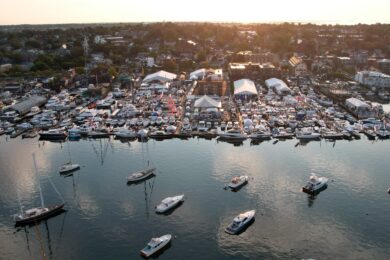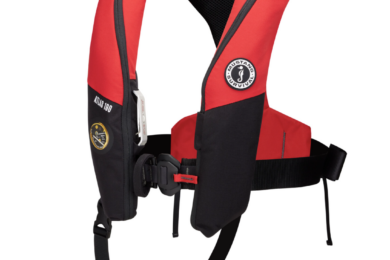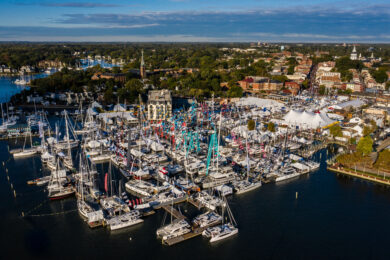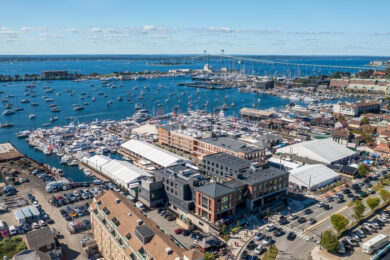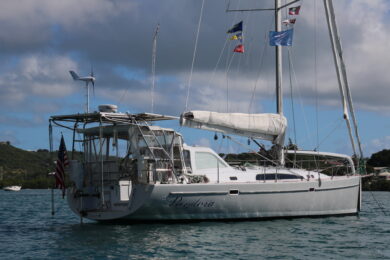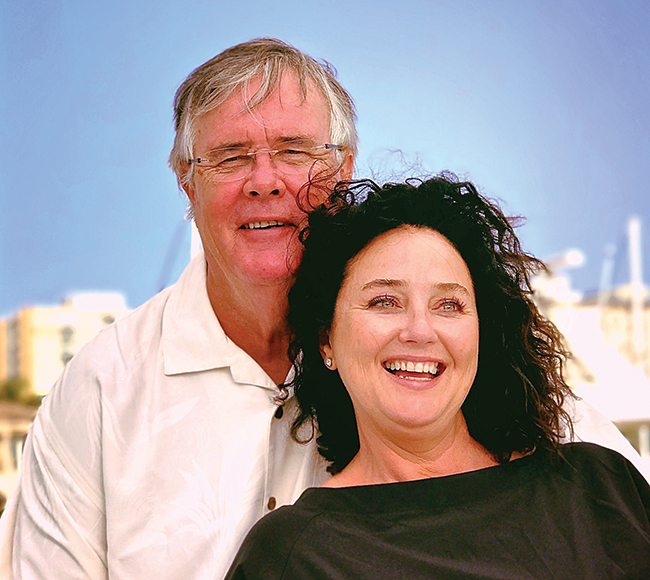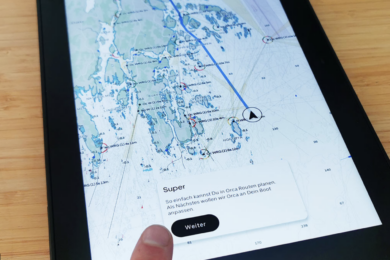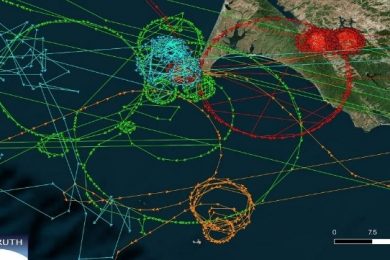
e
The Transat bakerly is yet again one for the history books as some of the best solo sailors slugged their way across the Atlantic from Plymouth on England’s south coast, to New York City (Published August 2016)
The Transat has always attracted the best sailors despite the fact that it’s often a brutal 3,000 nautical miles upwind slog. For this edition it attracted 25 sailors in four classes: Ultime, IMOCA/Open 60, Multi 50 and Class 40. The race has also attracted it’s fair share of sailors looking to do what others deem impossible. In 1976 Frenchman Alain Colas showed up with a gigantic monohull, Club Méditerranée, which measured in at a whopping 236 feet. He silenced everyone when he made it safely across the Atlantic in what must surely have been a superhuman effort. For this edition of the race there was an entire new class created especially for those superhumans who wanted to take on the seemingly impossible. The Ultime Class is for multihulls of around 100-feet in length and for this race three boats took part; Macif skippered by Vendée Globe winner François Gabart, Sodebo skippered by Thomas Coville and Yves le Blevec aboard Team Actual. To imagine that one person could manage a boat that big is one thing, but to wonder how it must feel to be sailing on a razor edge at 30 knots knowing that if something was to go wrong that you could be in a whole lot of hurt is another thing altogether.

Image licensed to Lloyd Images
The three skippers made it look effortless and just six days and three hours after he started, Gabart crossed the finish line to take line honors. Macif covered the official course distance of 3,050 nautical miles in eight days, eight hours, 54 minutes and 39 seconds but his boat log showed something different. He actually sailed a total distance of 4,634 miles at an average speed of 23.11 knots. Gabart, along with Coville and le Blevec opted to sail south of the Azores High rather than face headwinds on a more direct route. It was a wise idea and Gabart and Coville were locked in a head-to-head battle for most of the way across. “After racing such a distance, our difference is ridiculous,” noted Gabart. “It’s awesome! We wanted to get some competition and it has delivered.” In the end it delivered more for Macif than Sodebo with Gabart beating Covill into New York by 10 hours.s expected, the race was not without drama with one boat abandoned, a bunch damaged and even the sentimental voyage by Loïck Peyron aboard the 50 year old Pen Duick II to celebrate the accomplishments of the great French sailor Eric Tabarly was cut short by sail damage. “Unfortunately I cannot continue into the wind without sails so for the moment I am proceeding back to Quiberon,” he wrote and on that wistful note Peyron turned around, pointed his bow toward France, and quietly dropped out of the race. Peyron is known for his never-quit attitude and has won the Transat on three previous occasions so his withdrawal was a surprise to many but only one of many surprises in the race.

Image licensed to Lloyd Images
The 14th edition of this iconic race started on May 2 off Plymouth Hoe, the same place where Sir Francis Drake played his famous game of bowls in 1588 while waiting for the tide to change before sailing out with the English fleet to engage with the Spanish Armada. While Drake may have been facing a life or death situation, the Transat sailors were facing their own kind of hell. A cold rain and building breeze at the start was just a precursor of what lay ahead. Less than a day into the race it was all over for Maxime Sorel aboard his Class 40 VandB. Sometime during the night he collided with a cargo ship damaging his bowsprit and mast. His boat was the first casualty and would soon be followed by others.
The most intense racing was among the IMOCA Open 60s with most of the skippers using the race as a shakedown for the Vendée Globe which starts later this year. If it was a shakedown they were looking for they certainly got one and it didn’t take long. Shortly after midnight on May 4, just two days into the race, Sébastien Josse aboard Edmond de Rothschild was sailing in 25-30 knots of breeze blowing from astern. He was locked in a head-to-head battle with Vincent Riou on PRB and Armel Le Cléac’h on Banque Populaire with just three miles separating them. Without warning the boat accidentally jibed, the boom swung across, and the battens wrapped around the rigging. “Everything happened very quickly, in maybe just 10 seconds,” Josse reported. “I broke the battens in the mainsail in a violent gybe. It is impossible to imagine that I could continue the race without battens.” And with that he retired.


While the Ultime trimarans were able to dive south, the rest of the fleet was not so lucky as a low pressure system eastward tracked across the Atlantic directly toward them leaving the bulk of the fleet with no place to hide. The forecast was for gale force headwinds. “I maintain the boat in anticipation of the next challenge, a very active depression with gusts of up to 50 knots,” reported Louis Duc aboard the Class 40 Carac. “It’s a rare system and will be violent. We’ll be out of race mode and into security mode trying to keep the boat going with little to no damage inflicted.” Earlier in the week the leading Multi 50 was badly damaged forcing the skipper Erwan le Roux out of the race so breakages were on everyone’s minds. Fortunately all the boats came through relatively unscathed.
In the IMOCA 60 Class there was a close battle for the lead between Vincent Riou on PRB and Armel Le Cléac’h on Banque Populaire. Riou had taken an early lead but by the halfway stage Le Cléac’h had taken over the top spot and he would hold onto it all the way to New York finishing on a mild Manhattan morning 12 days and two hours after he crossed the start line. Vincent Riou finished just two hours later and revealed that he had been sailing without instruments since a few days after the start. While many speculated that the new lifting foils on Banque Populaire had given Le Cléac’h the edge over the foil-less PRB, the speculation changed to just how much distance Vincent Riou might have lost without instruments and if the result might have been different. While the two French sailors enjoyed their successes on the docks in Brooklyn, the first Multi 50 crossed the finish line. With Erwan le Roux out of the race the field was open and a relatively unknown French sailor by the name of Gilles Lamire aboard French Tech Rennes St Malo stole the victory.

For much of the race one of only two female sailors in The Transat led the Class 40 division. Isabelle Joschke, a Franco-German sailor was in a very close match with Phil Sharp from England and Louis Duc on Carat. Unfortunately, as the Class 40s started to close in on the finish Joschke’s boat Generali suffered structural damage to the bow and was taking in water. After a make-shift repair that stemmed the flood and after consulting with her shore team, Isabelle took the hard decision to divert to the French islands of Saint Pierre and Miquelon which are located right off the Canadian coast. She would not rejoin the race and the Class 40 division was eventually won by Thibaut Vauchel-Camus aboard Solidaires En Peloton-Arsep. Now there is a mouthful.
On May 14, British sailor Richard Tolkien (yes he is related to J.R.R Tolkien) announced that he was abandoning his boat after he was hit in the face while changing sails in a storm. He activated his AIS (Automatic Identification System) to call up the nearest ship and the Anton Topic and its captain and crew were not too far away and came to his rescue. He was taken aboard leaving the tracker on his boat switched on in the hope of returning with a rescue party.

Of the 25 boats that made it across the start line off Plymouth, 18 finished in New York. The last boat to finish was the Japanese sailor Hiroshi Kitada who realized a lifelong dream of crossing the Atlantic alone. He was the first Japanese sailor in the history of The Transat and his words pretty well sum up the sentiments of most of the sailors who competed. “I am very happy, I can’t find the words to express how I truly feel,” he said. “I did not understand why everyone was asking me why I chose to take part in this race to begin with. I realized how difficult it was after I started.”

Brian Hancock is a sail maker, author, lecturer and veteran offshore sailor and racer. He lives in Marblehead, Mass.

